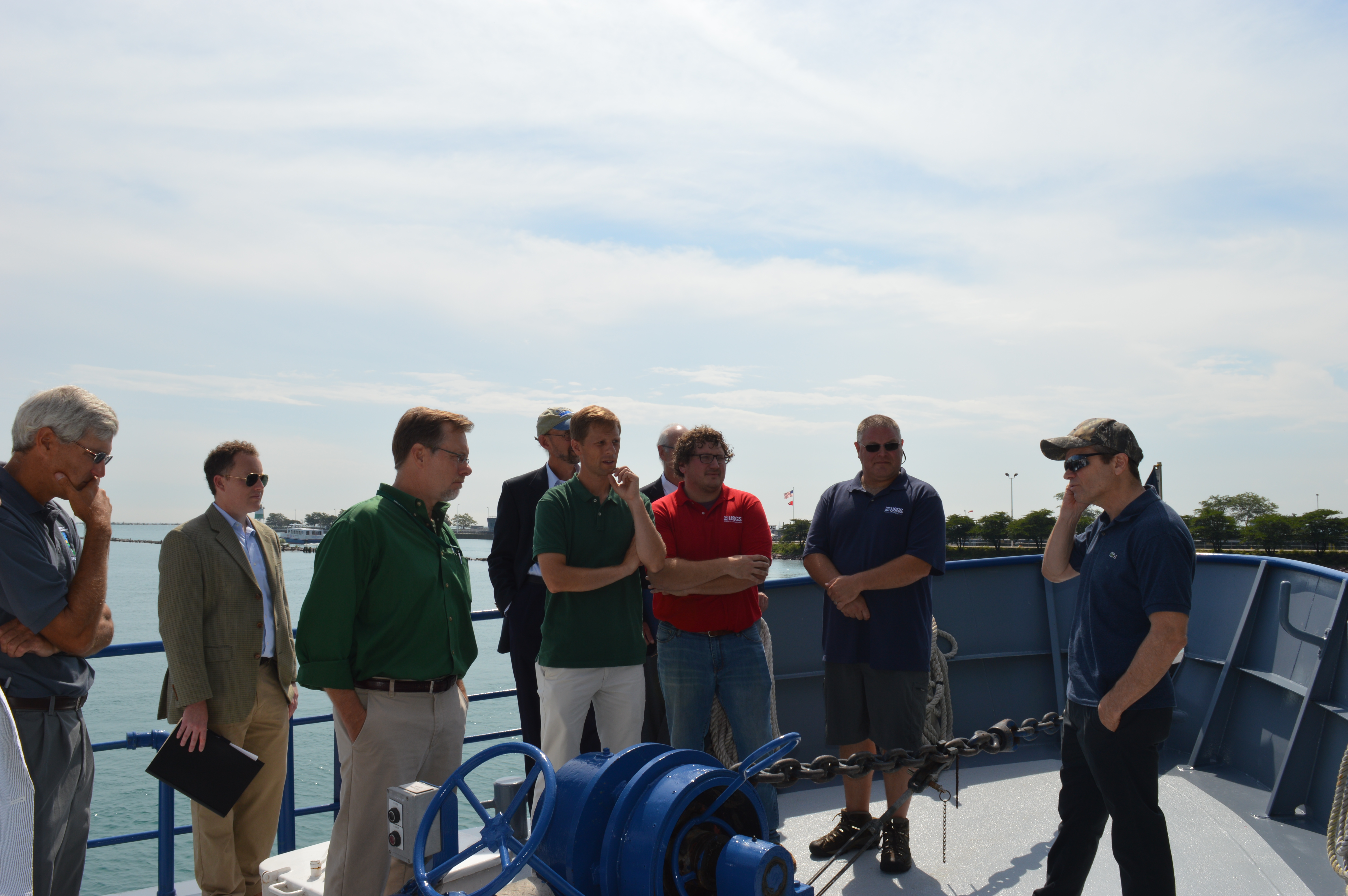Quigley Highlights Importance of Great Lakes Research Funding
CHICAGO – Today, U.S. Representative Mike Quigley (IL-05), a member of the House Great Lakes Task Force and the House Sustainable Energy and Environment Coalition, visited the U.S. Geological Survey’s (USGS) Research Vessel Sturgeon at Navy Pier. During the one-hour visit, Rep. Quigley, USGS leadership, and other partners talked about the value of the Great Lakes fishery, the changing ecology of the Great Lakes, the threat of invasive, non-native species to the Great Lakes’ ecosystem, the inter-jurisdictional management structure, and the role of the USGS.
“Chicagoans understand the role the Great Lakes play as an economic driver for our region. The USGS is doing amazing work in order to protect and improve this unique resource. Today’s tour aboard Research Vessel Sturgeon highlighted how scientific advancements and research technologies enhance our understanding of the Great Lakes ecosystem and help cultivate a healthy and productive fishery,” said Rep. Quigley. “I am very grateful to the team on R/V Sturgeon as well as the leadership at the USGS for an informative visit and tour today. I will continue working in Congress so that the USGS has the authorization and funding it needs to provide science to policymakers managing the complex challenges of the Great Lakes ecosystem.”
"The Great Lakes fisheries are important cultural, ecological and economic resources, and the USGS collaborates with its partners to explore improved techniques for measuring, describing and predicting ecosystem changes," said Bill Lellis, Acting Associate Director for the USGS Ecosystems program. "We are at the brink of a new frontier in development of advanced technologies to better study the Great Lakes. No single entity can do it all, so we thank our partners and Representative Quigley for their support."

David Ullrich, Chair of the Great Lakes Fishery Commission (left), Rep. Quigley (center), and Dan Makauskas, Project Manager for Division of Fisheries of Illinois Department of Natural Resources (right), dicuss the commerical fishing industry aboard the Sturgeon.
In February, Rep. Quigley introduced a bipartisan bill, the Great Lakes Fishery Research Authorization Act of 2016, to provide the USGS Great Lakes Science Center with the robust research authorization and dedicated funding it needs to conduct critical research and support the $7 billion Great Lakes sport and commercial fishery industry.
Rep. Quigley met with William Lellis, Acting Associate Director, USGS Ecosystems Mission Area (Reston, VA); Kurt Newman, Western Basin Branch Chief, USGS Great Lakes Science Center; David Warner, Fisheries Research Biologist, USGS Great Lakes Science Center; Dave Ullrich, Chair, Great Lakes Fishery Commission; Dan Makauskas, Lake Michigan Fisheries Specialist, Illinois Department of Natural Resources; Matt McKenna, Great Lakes Washington Program Director, Northeast Midwest Institute; and the USGS R/V Sturgeon vessel and science crew.
The Sturgeon is a member of the five-vessel Great Lakes research fleet operated by the USGS. The boats are used to conduct fisheries and aquatic research across the Great Lakes basin. The 104-foot vessel is operated by a professional crew of three and can support a scientific staff of seven for up to a 15-day mission.

From left to right: Dan Makauskas, Project Manager for Division of Fisheries of Illinois Department of Natural Resources; Matt McKenna, Great Lakes Washington Program Director-Northest Midwest Institute; Kurt Newman, Western Basin Branch Chief; Josh Miller, Science Communications Liaison; Bill Lellis, Deputy Director of USGS Ecosystems Mission Area; Steve Farha, Biological Science Technician; Dr. Dave Warner, Lead Biologist; with Rep. Quigley aboard the Sturgeon.
The USGS Great Lakes Science Center maintains staff and field stations in five of the eight Great Lakes states – New York, Ohio, Michigan, Indiana, and Wisconsin – owns and operates five large fishery research vessels, and is the only agency that conducts lake-wide fisheries science assessments on each of the five Great Lakes. The federal science conducted off these five vessels helps inform the fishery management regime.
As a member of the House Great Lakes Task Force and the House Sustainable Energy and Environment Coalition, Rep. Quigley has been a stalwart protector of the Great Lakes and the environment at large. Since assuming his role as the only Illinois member of the House Appropriations Committee, he has pushed for increased funding for the Clean Water and Drinking Water State Revolving Funds and worked to secure over $600 million in funding for the Great Lakes Restoration Initiative (GLRI). This summer, Rep. Quigley visited sites throughout Chicago during his “Chicago Climate Change Tour” to explore the local, ground level efforts to mitigate and adapt to the impacts of climate change, including efforts in green infrastructure, urban agriculture, water quality and research, and sustainable transportation. Last year, he went on a tour through the Pullman and Calumet region to highlight the positive impact environmental restoration can have on community development. He has urged his colleagues in the House to put partisanship aside and craft America’s first national energy plan to address climate change. Rep. Quigley has opposed the environmentally harmful Keystone XL pipeline and fought for increased protections against oil and gas drilling.
###